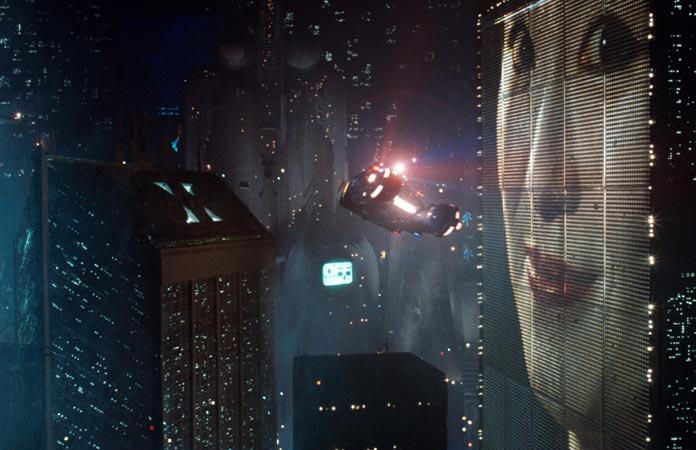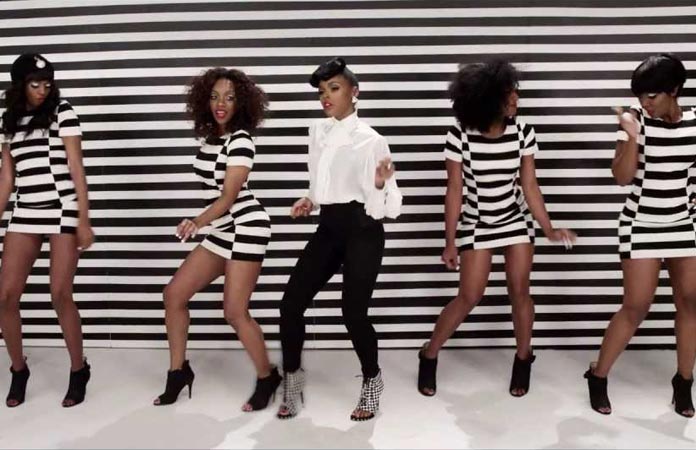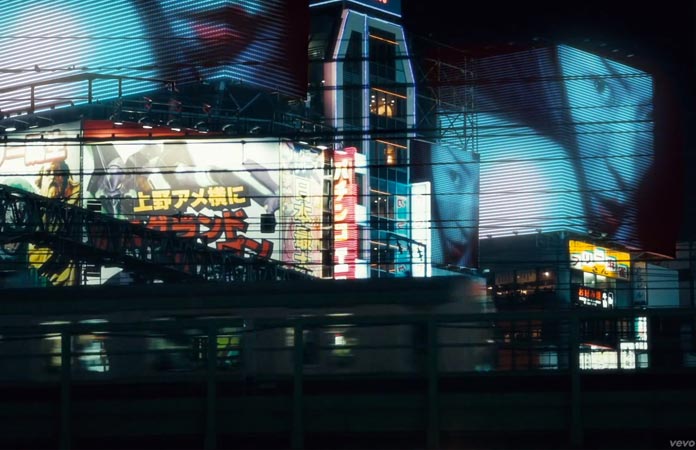Electric Lady (Kiss) Land: Blade Runner and R&B
Published on September 30th, 2013 in: Horror, Movies, Music, Science Fiction |By Paul Casey
“I’ve seen things you people wouldn’t believe. Attack ships on fire off the shoulder of Orion. I watched C-beams glitter in the dark near the Tannhauser gate. All those moments will be lost in time… like tears in rain. Time to die.”
—Roy Batty in Blade Runner
Ridley Scott’s Blade Runner is distinct from the novel from which it originated. Phillip K. Dick’s Do Androids Dream of Electric Sheep? is not just different because of the usual Hollywood clatter involved in an adaptation. The novel and the film come from the same concept but approach it with a radically different philosophy. In the novel the androids are a stand-in for humans who lack empathy, those who are cruel without feeling. Any moral ambiguity about the behavior of Deckard and the humans towards these artificial beings is wiped away by the end of the novel with an affirmation of the essential quality of humans. The major problem Dick had with Ridley Scott’s adaptation during its production was this philosophical divergence.
Where Dick saw cruel, heartless machines as a commentary on the kind of humans he despised, through the many variations of the screenplay by Hampton Fancher and David Peoples, Ridley Scott saw the replicants as representing the possibility of humanity as creators and overseers. And most importantly our moral duty to treat such creations with dignity and respect. (Humans as Gods would be further examined in Scott’s brilliant Prometheus.) There are obvious parallels with the shameful history of slavery, as well as the outsiders who society feels comfortable with demeaning. Blade Runner is a strange case of an adaptation which has the opposite meaning of the novel and yet remains a truthful interpretation of Dick’s vision.
In spite of his misgivings Dick would see a selection of footage before his death and rightly predict the importance of the picture to Science Fiction:
“Science Fiction has slowly and ineluctably settled into a monotonous death: it has become inbred, derivative, stale. Suddenly you people have come in, some of the greatest talents currently in existence, and now we have a new life, a new start. As for my own role in the BLADE RUNNER project, I can only say that I did not know that a work of mine or a set of ideas of mine could be escalated into such stunning dimensions. My life and creative work are justified and completed by BLADE RUNNER.”
How right he was! Blade Runner has had a huge influence on all kinds of creative expression since its release in 1982, not only in the genre but from architecture to countless movies to music. Two of the best albums released in this year of ours 2013, Kiss Land by The Weeknd and The Electric Lady by Janelle Monáe both owe a large debt to Ridley Scott’s picture and the book which spawned it. As with the original divide between Philip K. Dick’s novel and Ridley Scott’s film, the music by Monae and The Weeknd are philosophically apart.
In an interview with Urban Daily, Janelle Monáe said:
“I love Blade Runner. I love the hairstyles in Blade Runner. A lot of the shapes that I use, I got a lot of inspiration from the guy who started making the androids. I got a lot of styles from that movie, so fashion-wise it pushes lots of limits. But the overall story is captivating and just hearing the music from the ’80s, how it’s just kinda drugged-out a little bit. . . Yeah, I just think it pushes a lot of limits fashion wise and the story’s very strong. And it was actually one of the movies when I was writing Metropolis, it was one of our inspirations.”
The conceit that Janelle Monáe is a replicant/android is something that carried through from her debut The ArchAndroid to this year’s The Electric Lady. Monáe’s music is a big mash of styles but has a lot of the conceptual fever of Prince and Funkadelic, as well as a mess of their musical influence. Prince does a very rare guest spot on the opening track “Givin Em What They Love.” It is strange but welcome to see Prince appear on a (good) current artist’s album without demanding control. The Electric Lady pauses on occasion to give time to DJ Crash Crash, where he takes calls from fans, some of whom are disgusted about the prospect of android love. Two backward fans: “They should just do whatever they do to people like that. I mean she’s not even a person.” “Robot love is queer!”
Janelle Monáe makes empowerment music. Like Blade Runner it does not have to simply be an analogy for a current struggle, whether that is gay rights or racial equality. It is also about the possibility of our flabby bodies stepping over into that super-being category and creating something new which possesses consciousness. It is resolutely from the perspective of the replicant/android, from that being who was created and then cast aside. The Electric Lady, through the power and persuasion of Funk, R&B, Soul and Rock ‘n’ Roll flips power and redirects it.
In an interview with Complex Music, The Weeknd said:
“A lot of it is inspired by filmmakers like John Carpenter, David Cronenberg, and Ridley Scott, because they know how to capture fear. That’s what Kiss Land is to me, an environment that’s just honest fear. I don’t know who I am right now and I’m doing all these outlandish things in these settings that I’m not familiar with. To me, it’s the most terrifying thing ever. So when you hear the screams in the record and you hear all these horror references and you feel scared, listen to the music because I want you to feel what I’m feeling. Kiss Land is like a horror movie.”
First there is the visual style. Watch “Belong To The World” and it is difficult to avoid the impact of Blade Runner. The world is dystopian. The dancer’s face adorns the city in the same way as it does in Ridley Scott’s future Los Angeles. The woman brings joy and love to people who are dead inside. She is dead inside, or at least that has been her role in this world.
“I’m not a fool, I’m just lifeless, too.” If The Electric Lady is from the perspective of the replicant, Kiss Land is the human’s view; the human who has been deadened inside by their complicity in the treatment of these lesser members of society. Philip K. Dick in his novel was a victim of this. He was guilty of a lack of empathy for his characters and the possibility of a different reality to his own. Even when he felt he was railing against a self-serving myopia, he was enshrining it as the only legitimate way to live. If this story is set to serve as an analogy for current struggles of equality, Dick’s book presents a problematic solution to outsiders.
The most interesting part of Do Androids Dream of Electric Sheep? is when Deckard realizes that he has fallen in love with Rachael. They sleep together and for the first time Dick introduces some moral ambiguity and suggests the possibility that this machine could have a place in the world. This is quickly followed by a fairly embarrassing reveal that Rachael was simply seducing Deckard to make it tougher for him to do his job of murdering sentient beings for having the audacity to live. Those conniving robot women eh?
In Blade Runner Deckard turns out to be one of the replicants he is tasked with hunting. We are forced to identify with his plight and up until that reveal—seen far more explicitly in the Director’s Cut—we nod and chuckle at his typically human behavior. He’s getting a drink! Hey those damn dirty robots don’t need a drink after murdering someone! Kiss Land is a story from this perspective. At first you may believe that the singer is the powerful one and that the women are victims. As it moves along though you realize that like Deckard, The Weeknd is just as trapped as anyone else. He is, like the women who occupy his thoughts, an outsider. He thought he was the policeman with the badge and the gun, when really he is a replicant through and through.
The album closes with “Tears in the Rain” and like that scene where Roy Batty allows Deckard to realize his place in the world, The Weeknd expresses that same conflict between the wonder and beauty in life and the low down and bleak. Yes you can grow as a person. You can learn whether you count in the scheme of things, but boy is it going to hurt. As he sings, “I deserve to be by myself because I’ve gone too far to give up. And even if I changed it would be too late.”
Where The Electric Lady is uplifting and empowering, the story of a righteous dissident fighting for every wronged being in existence, Kiss Land is from the other side. It is about someone who thought they knew where their place was but ended up lost. A person who has money and power but who cannot find peace, and when they do find someone they love it can’t work. I’m a Blade Runner and you’re a replicant. It is about the pain that is required to become a human. It is a Horror story. Like the best Horror stories though it is one of discovery. If you can get past being disturbed by behavior you disagree with and think on your own human problems, maybe you can learn something. Use some of that empathy and have a listen.



Time limit is exhausted. Please reload the CAPTCHA.